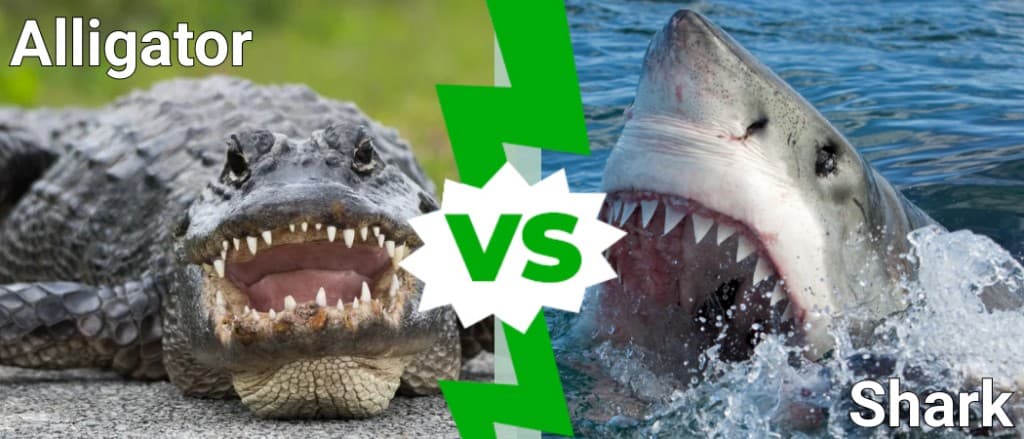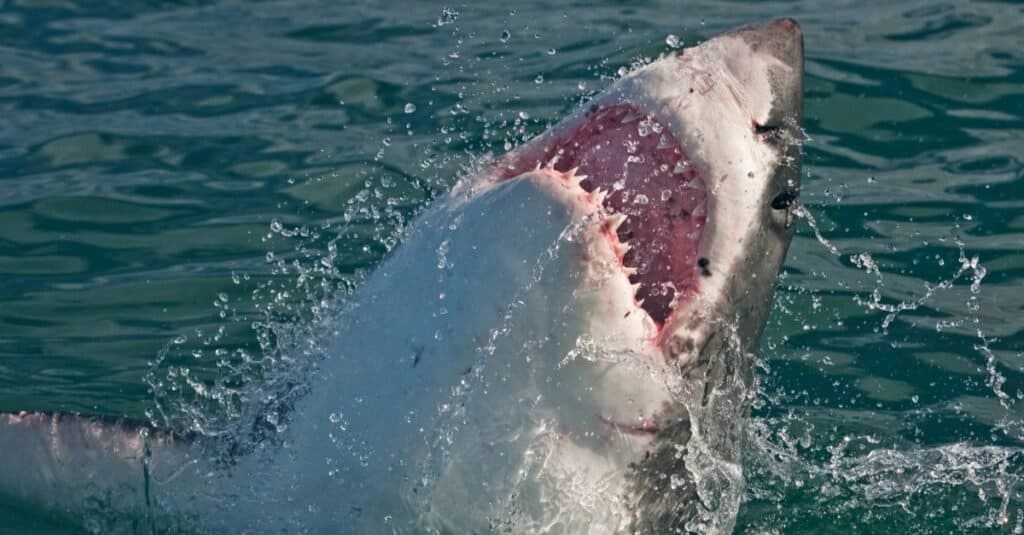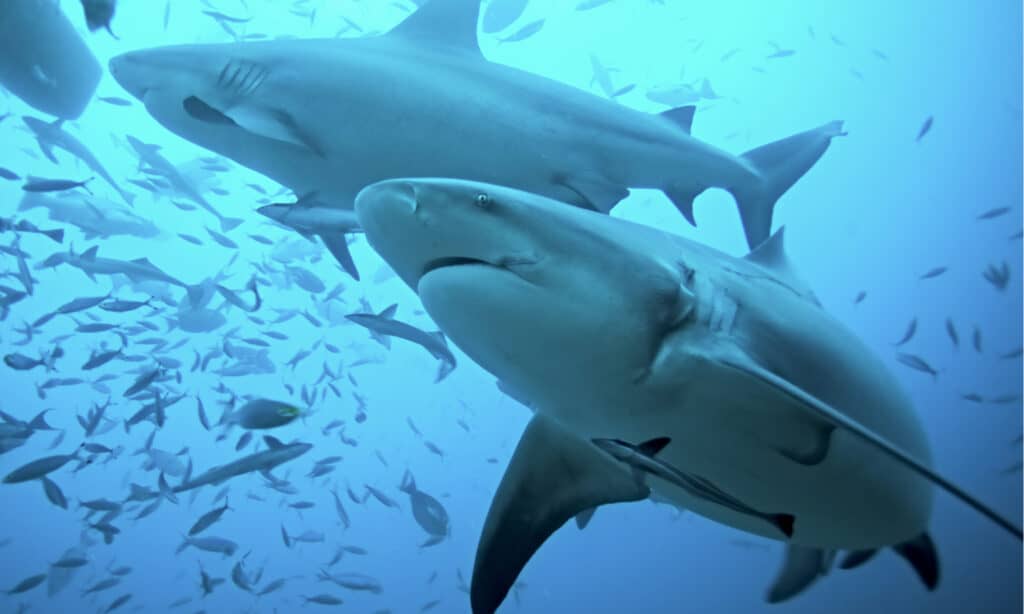A few apex predators in the world today strike immense fear into humans, thereby creating numerous conversations between friends. For example, two people might ask one another, would you prefer to get attacked by a Komodo dragon or a tiger? Two frequent members on the list of animals nobody wants to encounter are alligators and sharks. They’re large, strong animals that prefer to attack from concealed positions in the water. It’s no wonder humans don’t want to see them. So, in a contest of an alligator vs shark, which of the two is a deadlier predator?
We’re going to take a closer look at what makes these animals so powerful and frightening so that we can understand which one is deadlier.
Comparing an Alligator vs Shark

| Alligator | Shark | |
|---|---|---|
| Size | Weight: 400lbs to 800lbs (sometimes more) Height: 1ft – 2ft off the ground Length: 8.2 feet to 15 feet long | Weight: 1,000lbs – 5,000lbs (Great white sharks can reach 5,000lbs) Length: 11ft – 21ft |
| Speed and Movement Type | – 30 mph over short distances on land – Locomotion includes swimming and scampering on the ground. | – 20- 25 mph – Uses an undulating, side-to-side motion from the tail and body. |
| Bite Power and Teeth | – 2,980 PSI bite power – Roughly 80 teeth – Teeth roughly 2” in length | – 4,000 PSI – About 50 teeth are available to bite in the first row, but 300 teeth overall – Teeth 4-6 inches long |
| Senses | – Poor vision in water due to protective eye membrane – Good sight on land – Highly receptive to vibrations – Strong sense of smell. | – Good vision with sharp focus and night vision – Great whites hear low frequencies, but it’s not their best sense – Incredible smell for substances at 1 part per 10 billion parts of water – Possess ampullae of Lorenzini to detect electrical fields |
| Defenses | – Camouflage – Size – Speed – Hissing threat display | – Large size – Bursts of swim speed – Some camouflage when viewed from above or below |
How Can We Tell the Deadlier Predator?

Great whites are the world’s largest predatory fish.
©Martin Prochazkacz/Shutterstock.com
Just looking at the statistics about the animals that we have compiled above is not enough to say which creature is the deadlier predator. After all, is it fair to say that since sharks kill more people on average per year, they’re the deadlier predator? How about when we factor in the limited range of alligators compared to sharks?
What we’re going to do is examine four facets of these two animals. By looking at their predation from multiple standpoints, we’ll gain valuable insight into which of them is the most dangerous predator.
Alligator vs Shark: Size and Power
The largest shark species in the world are much larger and more powerful than alligators. For example, a female great white shark can weigh over 4,000lbs and measure 21ft long. It has a bite power that exceeds 4,000 PSI with teeth two or three times longer than an alligator’s teeth.
The largest alligator species, the American alligators, only weigh between 400lbs and 800lbs. They can exert a powerful 2,980 PSI bite on their foes, and their teeth are 2 inches long. That is a powerful creature, but it’s not that strong compared to a shark.
Sharks win the contest of size and power with ease.
Alligator vs Shark: Predation Techniques
Both alligators and sharks are ambush predators. They use camouflage to hide and then take their prey by surprise, but they each use different methods. For example, alligators are known for having a very strong sense of smell and being receptive to vibrations rather than relying on vision to identify prey.
Alligators prefer to wait at the water’s edge for prey to take a drink, and then they attack. Often, they will bite and clamp down on their prey, thrashing them about and dragging them into the water to kill them. If they grab a limb, they’ll perform a “death roll” that sees the reptile rolling over and over to dismember that part of the body.
Sharks are ambush predators that attack from behind and below their prey. Sharks have keen senses that help them locate prey from very far off. They can smell small concentrations of blood in the water, sense movement, and even pick up on the electrical fields of their prey.
When sharks attack, they often crash into their prey and bite simultaneously. They deliver a horrific bite that punctures skin and organs, breaks bones, and removes flesh.
In terms of the danger posed by these techniques, the shark may be more forgiving because it is smarter than the alligator. Sharks will often “test” their potential prey by giving it a relatively weak bite. Alligators are not known for doing this. They tend to attack all-out when it comes to getting prey. This could stem from the greater abundance of available prey for sharks than alligators.
Yet, that doesn’t mean the shark’s predation technique is poor. They can still deal more damage than an alligator.
Alligator vs Shark: Which Animal Kills More Humans Per Year?
On average, alligators kill about 1 person in the United States every year, and about 10 people are bitten per year. Some attacks happen when alligators are provoked, but others are unprovoked. Most of the time, it’s the elderly or children who are killed.
Roughly 30 to 40 unprovoked shark attacks happen each year, and about 8 of those individuals die as a result. However, shark interactions, attacks, and deaths are rising around the world. From 2016-to 2020, the average number of incidents rose to 72 bites per year, but only about 9 of them were fatal.
Just looking at bare numbers, sharks kill more people. However, roughly 10% of alligator attacks are fatal, and about 8% of shark attacks are fatal. For humans, you’re more likely to walk away from a shark attack than an alligator attack.
Of course, some exceptions to this rule exist. Major swarming alligator attacks are basically unheard of, not counting the deadliest crocodile attack in human history on Ramree Island. However, several major shark attack incidents, such as the events following the sinkings of the USS Indianapolis and the Cape San Juan, involved hundreds of people dying to sharks in a few days.
Alligator vs Shark: Who Wins in a Fight?
A shark would beat an alligator in a fight. Sharks are more adept at swimming and attacking aquatic prey. The shark would use its superior senses to find the gator in its waters, and it would attack from below and behind the alligator to give it no chance of survival. A single massive bite would leave the much-smaller alligator without a limb or with so much flesh removed that a counterattack would be unthinkable.
An alligator may be able to bite a shark and inflict some wounds, but it’s not going to death roll something that weighs twice as much as it. Even if it did manage to catch a fin in its mouth, the counterattack by the shark would be vicious and deadly.
Alligator vs Shark: Who Is the Deadlier Predator?

Bull sharks, great whites, and ocean whitetips are all far more dangerous than alligators.
©Martin Prochazkacz/Shutterstock.com
Sharks are deadlier predators than alligators. Sharks have the advantage in every measure except the percent of fatal attacks on humans, including the size of the prey they attack. A single great shark managed to attack, wear down, and kill a humpback whale in 2020.
That creature was 33ft long and weighed thousands of pounds more than the shark. That sort of power and tenacity is simply not there for alligators. They can take down large prey like deer and even large felids, but they lack the overall power and capability to attack massive prey.
When you look at the whole of the situation, it’s clear that sharks have far more power, better predation techniques, and can kill almost anything in the ocean. They are far deadlier than gators.
The photo featured at the top of this post is © Thierry Eidenweil/Shutterstock.com
Thank you for reading! Have some feedback for us? Contact the AZ Animals editorial team.






